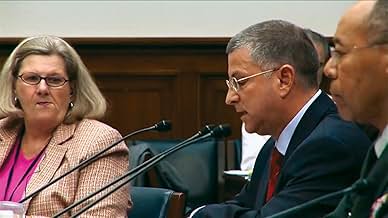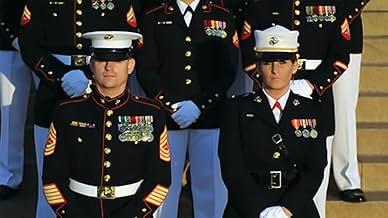IMDb RATING
7.6/10
7.4K
YOUR RATING
An investigative documentary about the epidemic of rape of soldiers within the US military.An investigative documentary about the epidemic of rape of soldiers within the US military.An investigative documentary about the epidemic of rape of soldiers within the US military.
- Nominated for 1 Oscar
- 11 wins & 14 nominations total
Ariana Klay
- Self - US Marine Corps
- (as Lieutenant Ariana Klay)
Elle Helmer
- Self - US Marine Corps
- (as Lieutenant Elle Helmer)
Debra Dickerson
- Self - US Air Force
- (as Ret. Captain Debra Dickerson)
- Director
- Writers
- All cast & crew
- Production, box office & more at IMDbPro
Featured reviews
so you love your country, you love the military, you are patriotic, and you come from the military family tree, you love the uniform, you love the g.i. bill. when you are under fire, you rely on your soldier comrades to help you fighting back and remain alive. but when you are raped, all these kind of illusion are gone, your whole life is shattered, you suffer untreatable damages not just your body but your soul, your faith, your patriotism. all those you believed before suddenly become lies. the united states military forces suddenly become a huge monster that you would never know how to deal with. these accusations only fall on deaf ears. suddenly you become a slot, an adulterer, a shameless bitch, damaging the military reputation. the raped ones not only become the victims when they were raped by either their comrades or their superior ranking officers. so they are threatened to become a second-time victims. where is the justice, where are the constitution rights and human rights for those who were being raped and continuously being raped? the American government always like to meddle with other countries' human rights but they can't even justify what their own citizens' basic human rights. the American government is the biggest lying and phony entity in the world and probably in the whole universe.
"The Invisible War" is Oscar-nominated documentarian Kirby Dick's latest exploration of something terribly wrong with a venerable institution. Previous targets of Dick's camera have been the Catholic Church and its handling of child abuse cases ("Twist of Faith,") closeted politicians undermining advances in gay rights ("Outrage,") and Hollywood's incomprehensible ratings system ("This Film is Not Yet Rated.") This time he takes on the U.S. Military and its abominable record in the handling of sexual assaults on and by active duty service people.
The film consists of interviews of victims of sexual assault with cases going back to the 1960's up to the present day. The victims (both male and female) relate the horror inflicted upon them – not just by their perpetrators, but by a military justice system that fails them. Many of the victims state that the pain the went through with the assault was nothing compared to the hell that they went through in their attempts to seek justice, proper medical and psychological care for their trauma, and to return to some sort of normalcy in their lives.
Filled with damning statistics (20% of all female military personnel have dealt with sexual assault – does that not bother you?) and interviews with bureaucrats (both military and political,) it's the personal stories of those who tried to serve their country that get to you. These men and women entered to honorably serve and were driven out by a system that believes it's more important to protect one's own (usually meaning an officer) rather than support their troops.
The film is a call to action to make one simple change to the current military system. The decision whether to prosecute a case is made by the site commander. Often, this commander knows or has a relationship with the accused. Does this not seem like a conflict of interest? The film highlights a group that is seeking to change that and encourages the viewer to express their outrage to those who might be able to change things. They want you to do more than slap an "I Support Our Troops" bumper sticker on your car. Will you really support your troops? Really? The facts, figures, and stories in "The Invisible War" should turn the stomach of every citizen of our nation, regardless of political affiliation. This is not a political issue. This is a criminal justice issue. This is a human rights issue.
This is activist filmmaking at its best.
www.worstshowontheweb.com
The film consists of interviews of victims of sexual assault with cases going back to the 1960's up to the present day. The victims (both male and female) relate the horror inflicted upon them – not just by their perpetrators, but by a military justice system that fails them. Many of the victims state that the pain the went through with the assault was nothing compared to the hell that they went through in their attempts to seek justice, proper medical and psychological care for their trauma, and to return to some sort of normalcy in their lives.
Filled with damning statistics (20% of all female military personnel have dealt with sexual assault – does that not bother you?) and interviews with bureaucrats (both military and political,) it's the personal stories of those who tried to serve their country that get to you. These men and women entered to honorably serve and were driven out by a system that believes it's more important to protect one's own (usually meaning an officer) rather than support their troops.
The film is a call to action to make one simple change to the current military system. The decision whether to prosecute a case is made by the site commander. Often, this commander knows or has a relationship with the accused. Does this not seem like a conflict of interest? The film highlights a group that is seeking to change that and encourages the viewer to express their outrage to those who might be able to change things. They want you to do more than slap an "I Support Our Troops" bumper sticker on your car. Will you really support your troops? Really? The facts, figures, and stories in "The Invisible War" should turn the stomach of every citizen of our nation, regardless of political affiliation. This is not a political issue. This is a criminal justice issue. This is a human rights issue.
This is activist filmmaking at its best.
www.worstshowontheweb.com
I am writing this review two days before Veteran's Day on purpose, not out of sheer, fortunate coincidence. When president Dwight Eisenhower declared November 11th a day of remembrance and observation for current war veterans and those who have died in combat, I highly doubt he knew that one day, there would be surrounding controversy that female members of the military were facing rape and sexual assault cases, and little was being done to punish those involved. Speaking as someone who loves the country he's been fortunate to be born into and someone who continuously supports, gives credit to, and thanks veterans for their service, this is an appalling and sickening feat that almost taints the entire military system as a whole.
Kirby Dick's The Invisible War is a film that will have an unprecedented impact on many of its viewers. Some of its viewers, hopefully young women contemplating serving in a specific branch, may second-guess their decision to join. Statistics show that 20% of women in the military have been raped, the second they are part of the military, their chances of rape increases by two, and the most terrifying statistic of all; 15% of recruits entering the military have raped someone before.
We meet several women raped under many different circumstances, who have served in the U.S. Coast Guard, the Navy, and even the Marines, yet can not escape the frighteningly real numbers. The main woman we follow throughout the film is Kori Cioca, a young member U.S. Coast Guard, who was brutally raped shortly after joining the military branch, and during the rape, she was slapped so hard on the left side of her face that it dislocated plates in her jaw, resulting in her only consuming soft foods and bearing only warm weather. Her struggle, now, is number one, receiving compensation and money from the VA, which is turning their back on her because her deployment was too brief to qualify for money or treatment, and number two, trusting males again (when we see her with her loving and devoted husband we see how nervous, unsettled, and provoked she feels with him in the room).
Aside from hearing cases and a number of devastating rape stories from women, Dick interviews lawyers who have worked on military rape cases and talks to a number of authors on the subject. One even states how that the punishment for rape is so lenient and miniscule that a person who has done drugs and is caught can be suspended for years, but a person who has raped another individual can be suspended for just a few weeks.
And if you believe this is a problem reserved for women then think again; 10% of men in the military are raped and we aren't deprived of hearing their shocking stories as well. One man who was a victim to the heinous crime states that it's a byproduct of the military's almost inherent homophobia, the outdated feeling of "the macho man," and the idea of power through narcissism. When will we, as a nation, overcome those three depressing qualities? It's hard to call The Invisible War "enjoyable" in the usual documentary-sense. It's one of the most impacting films of the year, and should be required classroom viewing at that. Director Kirby Dick is known for exploring institutions that are surrounded by grayness, such as the Catholic Church in Twist of Faith and the biased, inconsistent MPAA in This Film is Not Yet Rated. Unlike in those films, Dick remains silent, letting the larger stories speak first and him not giving his usual goofy spin on things. Considering how highly we praise and cherish our military, having this film come out, exposing the misogyny and disrespect to women in the male-dominated military, is a kick to the groin. Or possible a Miss Representation. As a viewer, you can decide.
Directed by: Kirby Dick.
Kirby Dick's The Invisible War is a film that will have an unprecedented impact on many of its viewers. Some of its viewers, hopefully young women contemplating serving in a specific branch, may second-guess their decision to join. Statistics show that 20% of women in the military have been raped, the second they are part of the military, their chances of rape increases by two, and the most terrifying statistic of all; 15% of recruits entering the military have raped someone before.
We meet several women raped under many different circumstances, who have served in the U.S. Coast Guard, the Navy, and even the Marines, yet can not escape the frighteningly real numbers. The main woman we follow throughout the film is Kori Cioca, a young member U.S. Coast Guard, who was brutally raped shortly after joining the military branch, and during the rape, she was slapped so hard on the left side of her face that it dislocated plates in her jaw, resulting in her only consuming soft foods and bearing only warm weather. Her struggle, now, is number one, receiving compensation and money from the VA, which is turning their back on her because her deployment was too brief to qualify for money or treatment, and number two, trusting males again (when we see her with her loving and devoted husband we see how nervous, unsettled, and provoked she feels with him in the room).
Aside from hearing cases and a number of devastating rape stories from women, Dick interviews lawyers who have worked on military rape cases and talks to a number of authors on the subject. One even states how that the punishment for rape is so lenient and miniscule that a person who has done drugs and is caught can be suspended for years, but a person who has raped another individual can be suspended for just a few weeks.
And if you believe this is a problem reserved for women then think again; 10% of men in the military are raped and we aren't deprived of hearing their shocking stories as well. One man who was a victim to the heinous crime states that it's a byproduct of the military's almost inherent homophobia, the outdated feeling of "the macho man," and the idea of power through narcissism. When will we, as a nation, overcome those three depressing qualities? It's hard to call The Invisible War "enjoyable" in the usual documentary-sense. It's one of the most impacting films of the year, and should be required classroom viewing at that. Director Kirby Dick is known for exploring institutions that are surrounded by grayness, such as the Catholic Church in Twist of Faith and the biased, inconsistent MPAA in This Film is Not Yet Rated. Unlike in those films, Dick remains silent, letting the larger stories speak first and him not giving his usual goofy spin on things. Considering how highly we praise and cherish our military, having this film come out, exposing the misogyny and disrespect to women in the male-dominated military, is a kick to the groin. Or possible a Miss Representation. As a viewer, you can decide.
Directed by: Kirby Dick.
Rape in the military is about as thorny and intractable a problem as deciding whether to go to mid-east war or not. The Invisible War solidly makes the argument that the military judicial process for rape is deeply flawed, if only because commanders are given the absolute right and power to determine how the accusations are handled.
Think about it: the commander could be the assailant or a friend and can dismiss a case with little recourse for the aggrieved soldier. This documentary hammers home both statistically and in practice how frustrating the process can be, sometimes leading to suicide. A recent court decision that rape is an "occupational hazard" doesn't help anything.
At the least, husbands and wives become tense or split; rarely is a marriage unaffected by the rape. For singles, the sympathy is not overwhelming, and without a support group, it is lonely out there to take on the chain of command. In a macho world where team attitude is high priority, rape allegations are not welcomed, especially if the rapist is the commanding officer.
As I find in many documentaries, only one side is examined (Michael Moore being the leading exponent of the lopsided argument). In the case of The Invisible War, we are well served with victims who get no satisfaction, but we don't experience fully the case where the accused is found to have been wronged by the accuser. However, the doc does an effective job with the stories of women who accused but rarely gained a conviction.
The percentage of adjudicated cases where the accused is found guilty is small. Given the thousands of allegations, that number seems too small. At any rate, after seeing this documentary, Secretary of Defense made a bold decision that confirms the efficacy of a well-made documentary.
Think about it: the commander could be the assailant or a friend and can dismiss a case with little recourse for the aggrieved soldier. This documentary hammers home both statistically and in practice how frustrating the process can be, sometimes leading to suicide. A recent court decision that rape is an "occupational hazard" doesn't help anything.
At the least, husbands and wives become tense or split; rarely is a marriage unaffected by the rape. For singles, the sympathy is not overwhelming, and without a support group, it is lonely out there to take on the chain of command. In a macho world where team attitude is high priority, rape allegations are not welcomed, especially if the rapist is the commanding officer.
As I find in many documentaries, only one side is examined (Michael Moore being the leading exponent of the lopsided argument). In the case of The Invisible War, we are well served with victims who get no satisfaction, but we don't experience fully the case where the accused is found to have been wronged by the accuser. However, the doc does an effective job with the stories of women who accused but rarely gained a conviction.
The percentage of adjudicated cases where the accused is found guilty is small. Given the thousands of allegations, that number seems too small. At any rate, after seeing this documentary, Secretary of Defense made a bold decision that confirms the efficacy of a well-made documentary.
The Invisible War not only us educates about the tragedy of rape in the military, about the cover-up of the crimes, but it educates us about the problem or rape in our society. The military commanders ignore and hide rapes and the statistics presented in the film of these crimes are important to note. I can't imagine anyone who actually saw this movie giving it less than an 8 ranking.
The interview of the victims is heartbreaking, and the interviews of those involved in the cover-up are aggravating. These women, and men, who face sexual assault in the military need our full support and the military culture must change. The movie is a powerful indictment of the military and a tribute to the strength of the survivors and their families and allies.
Peace, Tex Shelters
The interview of the victims is heartbreaking, and the interviews of those involved in the cover-up are aggravating. These women, and men, who face sexual assault in the military need our full support and the military culture must change. The movie is a powerful indictment of the military and a tribute to the strength of the survivors and their families and allies.
Peace, Tex Shelters
Did you know
- TriviaA rare example of a film actually influencing government/military policy, end credits state that "On April 14.2012, Secretary of Defense Leon Panetta, watched this film. Two days later, he took the decision to prosecute away from unit commanders." However, it was noted that "this is not enough." The preceding is a true statement, but can be misleading. Military Commanders still hold prosecutorial discretion, but they can no longer be in the unit where the alleged misconduct had taken place. An "outside, higher ranking colonel" would now hold prosecutorial discretion.
- Quotes
Kori Cioca - US Coast Guard: Thank you for your sacrifice, in whatever shape it may come with serving. God Bless.
- ConnectionsEdited into Independent Lens: The Invisible War (2013)
- SoundtracksNeed Someone
Performed by Mary J. Blige
Courtesy of Geffen Records under license from Universal Music Enterprises
- How long is The Invisible War?Powered by Alexa
Details
- Release date
- Countries of origin
- Official sites
- Language
- Also known as
- The Invisible War
- Production companies
- See more company credits at IMDbPro
Box office
- Gross US & Canada
- $71,968
- Opening weekend US & Canada
- $16,500
- Jun 24, 2012
- Gross worldwide
- $71,968
- Runtime1 hour 33 minutes
- Color
- Aspect ratio
- 1.78 : 1
Contribute to this page
Suggest an edit or add missing content



























